Earlier this week, an article appeared on CBC about women in agriculture, featuring a fellow enthusiastic women in agriculture and Ag Women Network member, Amanda Brodhagen. The piece couldn’t have come at a more opportune time with the focus we are trying to highlight about the important role women play in our industry. The article itself has generated thousands of views and created such positive social media buzz.
The work that Amanda is doing to be a spokesperson for our industry and for AWN, and the work that EVERY member of Ag Women’s Network is doing to champion women in agriculture is truly amazing. This conversation recently sparked a young woman by the name of Katelyn Ayers, to focus her attention on it when she competed this past fall in the 2016 Canadian Young Speakers for Agriculture Competition (CYSA).
The CYSA competition is held annually, each November at the Royal Agricultural Winter Fair (RAWF) to provide a platform for Canadian youth in agriculture, aged 18-24 to share their views and opinions on pertinent topics in the industry. This year, one of the five topics that competitors could choose to speak too was “Old MacDonald had a farm…But what about Mrs. MacDonald?.”
Katelyn, hailing from the University of Guelph, Guelph, ON spoke to this timely topic and for her efforts, was named one of the top six finalists at the 2016 competition among a field of 30 competitors!
With the topic of discussion this coming holidays surely to be the role of women in agriculture and how we can continue to foster this movement for the betterment of agriculture in Canada, enjoy reading Katelyn’s speech from the 2016 competition to hear her valuable perspective.
Congratulations Katelyn on a job well done and to YOU, our AWN readers and members who continue to keep the conversation alive and well on the vitally important role we a play as women in agriculture. Happy holidays (10 days to go!)
You can also watch Katelyn’s speech here on the CYSA youtube account.
***********************************************************************
Have you have heard the song “Amarillo Sky” by Jason Aldean?
He says, “Lord, I never complain, I never ask why
Please don’t let my dreams run dry
Underneath, underneath this Amarillo sky.”
It’s a song about a third generation Texan farmer who is struggling to make ends meet, battling high fuel and low commodity prices. He works hard in the field every day. Driving his tractor another round to provide for his family.
But why isn’t the song written about his mother, aunt, sister, daughter or wife? I’m not criticizing Jason’s song. He’s not the only one who neglects the female farmer’s story. In almost every country song the farmer described is male. Turn on the radio and I can almost guarantee there will be a song playing about some guy in his truck or tractor.
Honourable judges, fellow competitors, ladies and gentlemen of the audience, my name is Katelyn Ayers. I am a young woman with aspirations of working in agriculture in the near future, and gender equality in agriculture is a topic that hits close to home.
I myself was raised on a farm, my dad is a third generation farmer. He does the majority of the manual labour on his own. Seldom does he ask for help when changing the oil in equipment or unloading a gravity bin of grain. I have always looked up to my dad as the hardworking fulcrum who keeps the farm operations running smoothly. My mom, on the other hand, deals with the farm financials and files the taxes every year. They exemplify the stereotypical roles of a married couple managing a farm. This was my norm. I helped with occasional barn chores and drove equipment but usually only when an extra hand was needed. Dad could do most things easier and faster.
When he took over the family farm in the early 90’s, 74% of farmers were male. Now, 20 years later 30% of farmers in Canada are women. That’s 80, 500 Canadians with numbers continuing to grow! This number is even bigger in organic agriculture. According to the Certified Organic Associations of BC, 40% of organic operators are female.
It was not until I started my degree in agriculture at the University of Guelph that I really considered the possibility of women taking on the central role on the farm. In fact, many of my female friends are going through succession planning right now to one day take over the farm! This was (at first) mind blowing to me! It was not how my family worked. Now, in fourth year, my perspective has totally changed! My example, my model, my norm, has shifted.
Now, I am going to give you some historical context of gender equality in the workforce within Canada. Females have been viewed as inferior to men for thousands of years. It wasn’t until 1916 when women first received the right to vote in Canada. This was a huge step towards gender equality. However, perceptions were only changed slightly. The man was still considered the breadwinner while the wife stayed home to cook meals and raise the children.
Fortunately, women gained momentum as the 20th century progressed, through establishing clubs and organizations like the Federated Women’s Institute of Canada, Women’s Labour Leagues and the Canadian Federation of University Women, just to name a few. Women’s Institute has played a significant role in enhancing female leadership in agriculture. The focus of this group is recognizing the importance of organizing rural Canadian women so they might speak as one voice on important issues. Today, it continues its long tradition of giving a voice to rural women.
Now, in the 21st century, women have come a long way from being just “housewife” material. We are taking on prominent roles in the workplace and making major contributions to society. More modern examples of women’s equality movements include the creation of the Ag Women’s Network and the Women in Ag Conference. The Ag Women’s network is about cultivating and connecting agricultural leaders. This 1500-member network provides a forum for women to share their experiences and learn from one another, fostering relationships and empowering women to push themselves further. Also, this past April, 600 women attended the Advancing Women in Agriculture Conference in Calgary. Various hot topics were covered including “understanding how men view us and how to build a bridge in the workplace.” Despite these leaps and bounds made by women, there is still a ways to go before men and women will be considered on par around the globe. According to Catalyst Canada, Canadian women earn $0.82 to every $1 earned by men. Approximately 10-15% of this wage gap is due to discrimination.
The equality gap is especially evident in agriculture. A lack of work-life balance has been an ongoing issue for working women. According to Statistics Canada, on top of their jobs, women farmers are spending twice as much time as their husbands doing housework and three times as much time on childcare. This is likely due to the nature of the business. It is a heavily male dominated sector with the vast majority of those involved being men aged over 55, often with old-fashioned ideologies. Farmers need to evolve and realize that women engaged in agriculture is in fact normal. The close-mindedness passed from generation to generation of male farmers needs to come to a squealing halt. However, men are not the only perpetrators in this situation. There are also incidences of unconscious bias coming from women against their own gender.
Evidently, women haven’t exactly been welcomed into the ag industry with open arms. I’ve heard people make jokes like, if a family is without a son, the farm is destined for sale. Surnames will be forgotten and the farm will be lost. It is never considered that the daughter may want to keep her name and be interested in taking over the operation.
Women have a lot to offer the agriculture industry. The Harvard Business Review claims that companies with women directors deal more effectively with risk. Not only do they better address the concerns of customers, employees, shareholders, and the local community, but also, they tend to focus on long-term priorities. Women are breaking through the glass ceiling in agriculture.
Old Macdonald has owned the farm for years but I think it may finally be time to start succession planning so his keen daughter or granddaughter, Ms. Macdonald can continue the family tradition of farming. She’s ready to take over the tractor wheel and be the star of Jason Aldean’s next country billboard hit.
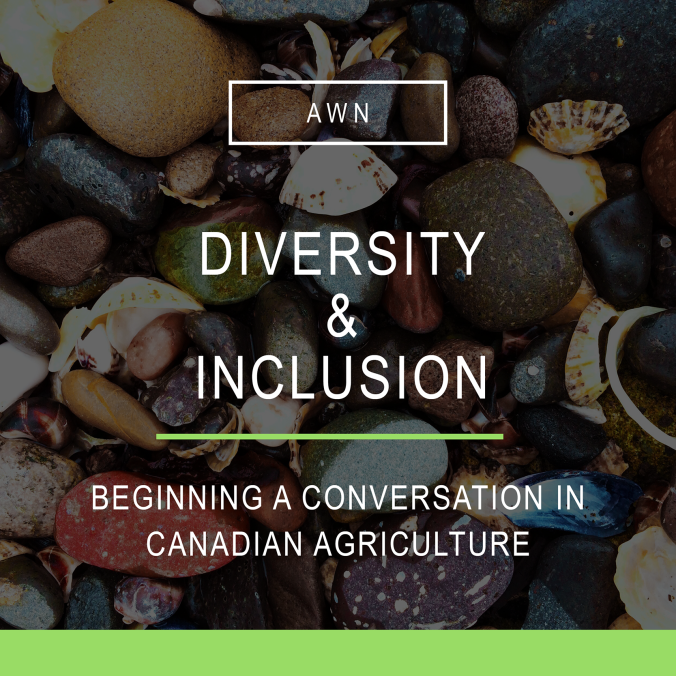 Diversity and inclusion. When I offered to organize a week on this topic, I knew that the words carried so much weight, so much responsibility, that the rest of the words to accompany them would not come easily.
Diversity and inclusion. When I offered to organize a week on this topic, I knew that the words carried so much weight, so much responsibility, that the rest of the words to accompany them would not come easily. Diane Stewart is the owner of BC Hop Company, a 35-acre hops farm in Abbottsford, about 100 kilometres southeast of Vancouver.
Diane Stewart is the owner of BC Hop Company, a 35-acre hops farm in Abbottsford, about 100 kilometres southeast of Vancouver.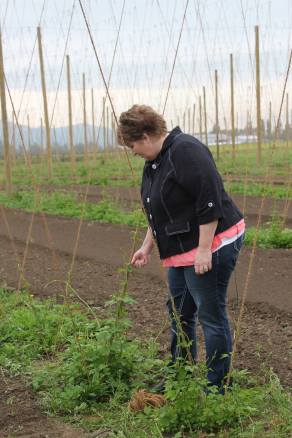
 She also says that BC does not have a lot of support networks for women in farming.
She also says that BC does not have a lot of support networks for women in farming. Please tell us a bit about yourself and your career path.
Please tell us a bit about yourself and your career path. Learning from our mistakes is an important, but sometimes tough, part of life. In the spirit of these profiles helping others, are you willing to share a mistake you made but taught you something important?
Learning from our mistakes is an important, but sometimes tough, part of life. In the spirit of these profiles helping others, are you willing to share a mistake you made but taught you something important? Find a mentor
Find a mentor In life, we do not consult just one single expert for everything. For example, you do not rely on your doctor for legal advice so why should you limit yourself to one expert to guide you in your career?
In life, we do not consult just one single expert for everything. For example, you do not rely on your doctor for legal advice so why should you limit yourself to one expert to guide you in your career? 5) Find the ‘water cooler’
5) Find the ‘water cooler’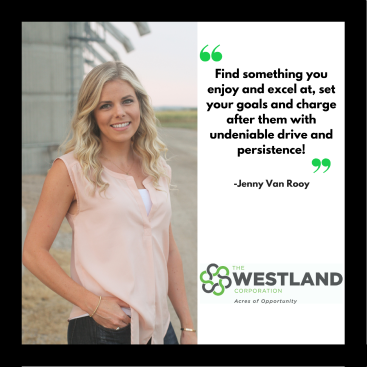 If I could have summarized this interview in one word, it would most definitely be ‘optimistic’. Jenny Van Rooy is the real deal. As an ambitious entrepreneur in agribusiness, she has successfully built The Westland Corporation into a prosperous new business
If I could have summarized this interview in one word, it would most definitely be ‘optimistic’. Jenny Van Rooy is the real deal. As an ambitious entrepreneur in agribusiness, she has successfully built The Westland Corporation into a prosperous new business I really don’t feel like the OBC attitude persists much anymore. Overtime I think this attitude has slowly faded. I talk to grain traders that have been in the Ontario grain trade for multiple decades, they tell me stories of how it “once was” – let me tell you that attitude and behaviour is not present anymore. Slowly over the decades there has been a shift. Any OBC attitude that’s left in the trade is very minor. -Jenny Van Rooy
I really don’t feel like the OBC attitude persists much anymore. Overtime I think this attitude has slowly faded. I talk to grain traders that have been in the Ontario grain trade for multiple decades, they tell me stories of how it “once was” – let me tell you that attitude and behaviour is not present anymore. Slowly over the decades there has been a shift. Any OBC attitude that’s left in the trade is very minor. -Jenny Van Rooy I’m originally from Burtch, ON, a small community in Brant County. I grew up around my extended family’s variety of agricultural operations: a dairy farm, cash crop farms, an equine operation, and a zoo! Despite all this, as a teenager, with a limited idea of what it could mean to work in agriculture, I eliminated it pretty quickly as a potential career choice for me.
I’m originally from Burtch, ON, a small community in Brant County. I grew up around my extended family’s variety of agricultural operations: a dairy farm, cash crop farms, an equine operation, and a zoo! Despite all this, as a teenager, with a limited idea of what it could mean to work in agriculture, I eliminated it pretty quickly as a potential career choice for me. 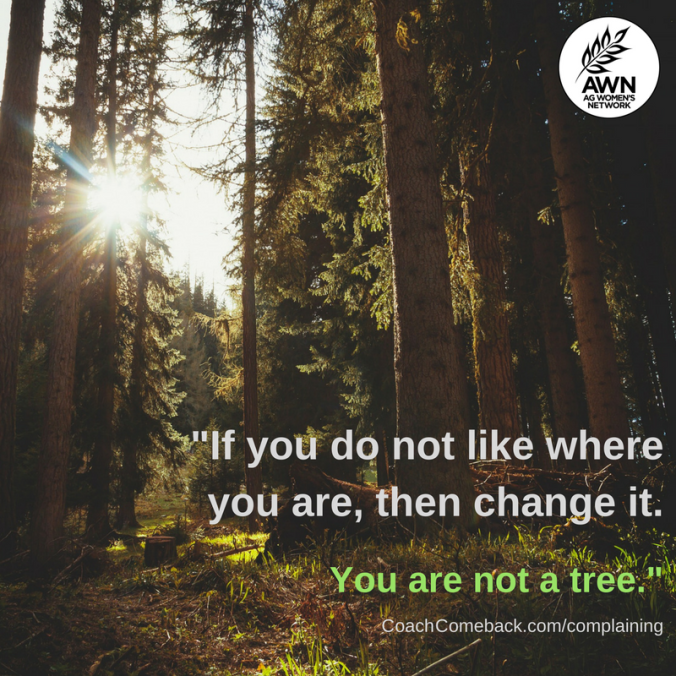
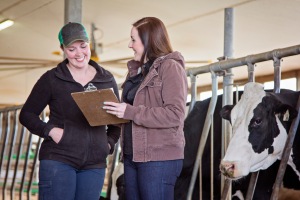 Finally, if you work in agriculture (or any industry for that matter), you can save yourself a lot of trouble by not assuming. Address everyone at the table, ask how they are involved (and consider women are more likely to downplay their role) and seek out their opinions.
Finally, if you work in agriculture (or any industry for that matter), you can save yourself a lot of trouble by not assuming. Address everyone at the table, ask how they are involved (and consider women are more likely to downplay their role) and seek out their opinions.
